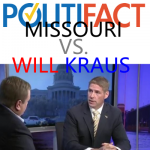 Will Kraus “Says Missouri needs a voter I.D. law because ‘there’s over 16 people in the state of Missouri who have been convicted of some type of voter fraud.'”
Will Kraus “Says Missouri needs a voter I.D. law because ‘there’s over 16 people in the state of Missouri who have been convicted of some type of voter fraud.'”
—PolitiFact Missouri
Overview
We don’t see the evidence supporting PolitiFact Missouri’s interpretation of Kraus’ remarks. We judge PolitiFact Missouri ruled “Half True” on a distorted version of Kraus’ claim.
The Facts
PolitiFact Missouri fact checked part of State Sen. Will Kraus’ (R-Jackson County) appearance on “This Week in Missouri Politics.” During his appearance Kraus addressed a question about the importance of a Missouri voter I.D. law by pointing to Missouri’s recent history of voter fraud cases.
SCOTT FAUGHN
Tell me why this (voter I.D. law) is important. I think some people think, well, I-I’ll bet you a lot of folks think of course you need I.D. to vote, you need an I.D. for many things in our current society. Walk me through why it’s important to have this law and why, why you should have to have an I.D. to vote.
WILL KRAUS
There’s over 16 people that have been convicted in the state of Missouri of some type of voter fraud. That shows that people in the state of Missouri are trying to cheat elections. We have a state representative that was elected by one vote. His aunt and uncle’s come out a couple years afterwards and plead guilty, basically, to voting in the wrong area. That shows that there’s an intent to try to cheat on elections. Photo I.D. is just a verification that you are who you say you are when you come to the polls. That’s why it’s so important.
PolitiFact Missouri focused on the first line of Kraus’ answer, that “over 16 people have been convicted in the state of Missouri on some kind of voter fraud.” PolitiFact Missouri found Kraus was able to support the claim:
Kraus didn’t give a timeframe for his statement. When reached for comment, his campaign emailed a report from the Heritage Foundation that pointed to 17 convictions since 2005.
PolitiFact Missouri used that objection as a springboard to its eventual “Half True” rating of Kraus. We’ll be raising our own objections to PolitiFact Missori’s reasoning.
Analyzing the Rhetoric
Problem One: Ignoring the Context
When Kraus stated over 16 people in Missouri were convicted of voter fraud, he explained the meaning of the statistic. He said the number shows people in Missouri are trying to cheat on elections. PolitiFact Missouri included that part of Kraus’ statement but treated it as irrelevant in its fact check.
Though Kraus said the statistic showed some people in Missouri were trying to cheat on elections, PolitiFact Missouri decided Kraus was saying the proposed voter I.D. law would fix the problem of voter fraud. PolitiFact Missouri makes that reasoning very clear in the conclusion to the fact check:
Kraus said Missouri needs a voter I.D. law because there have been more than 16 cases of “some type of voter fraud” in Missouri. That number isn’t wrong, but it doesn’t support Kraus’ assertion that photo identification would solve the problem — or that there is a problem of people impersonating voters.
PolitiFact Missouri misrepresents Kraus’ argument. Kraus did not simply argue that the 16-plus voter fraud convictions justified the voter I.D. law. He argued the convictions showed an intent in Missouri to cheat on elections, and he gave a second example supporting his claim. PolitiFact Missouri left the other example out of its story and gave its readers a weakened version of Kraus’ argument.
Problem Two: Fabulist Fact checkers?
Note in its conclusion PolitiFact Missouri said Kraus asserted that “photo identification would solve the problem.”
But Kraus made no such assertion. At most, Kraus implied that photo I.D. would help prevent voter fraud. When Kraus says some people in Missouri want to cheat on elections and uses that as a reason for voter I.D. legislation, it is reasonable to conclude the proposed law is intended to help address or even solve the problem.
We find no evidence Kraus “asserted” photo identification would solve the problem of voter fraud. PolitiFact Missouri’s poor choice of words distorts Kraus’ argument for photo I.D. and leaves a false impression with readers.
Problem Three: Burden of Proof
PolitiFact Missouri does not stop with saying Kraus claimed voter I.D. would fix the voter fraud problem. Its conclusion also states Kraus did not show that Missouri has a problem with fraud through voter impersonation.
It’s trivially true that Kraus did not prove voter impersonation is a problem in Missouri. But we do not see why Kraus needed to bear that burden of proof for the sake of the argument he was making. Kraus has a legitimate argument if Missouri is vulnerable to fraud by voter impersonation and if the proposed law makes that type of fraud more difficult.
That argument is not necessarily strong, but it does not require him to show evidence of voter impersonation.
Problem Four: Biased Experts
PolitiFact Missouri interviewed two experts for its voter fraud story. One, Laura Swinford, served as spokesperson for Missouri’s secretary of state before taking an executive position with a partisan advocacy organization, Progress Missouri. The other, Stephanie Fleming, replaced Swinford as the secretary of state’s spokesperson.
While we can imagine how the secretary of state’s spokesperson might have access to information on voter fraud through the office of the secretary of state, we can’t imagine any other reason to consider the spokesperson an expert on the subject of voter fraud. PolitiFact Missouri quotes the partisan former spokesperson liberally in its fact check. PolitiFact Missouri leaves it to the reader to figure out that “Progress Missouri” is a partisan advocacy organization. For that matter, PolitiFact Missouri does not report the name or party of the Missouri’s secretary of state, Jason Kander. Kander is a Democrat.
PolitiFact Missouri’s go-to experts on election integrity served as spokespersons appointed to their positions by a Democrat. PolitiFact Missouri offers no reason to consider either person an expert aside from their roles as spokespersons. We judge that a skimpy qualification aside from the likelihood of partisanship.
Is Voter Impersonation a Threat to Election Integrity?
PolitiFact Missouri stopped just short of arguing voter impersonation offers no threat to election integrity. PolitiFact Missouri said Kraus did not prove it was a threat, implicitly encouraging readers to commit a burden of proof fallacy.
We don’t know whether voter impersonation serves as a significant threat to election integrity. The crime is difficult to detect. Few have been prosecuted for voter impersonation. Those factoids offer a weak case that voter impersonation is rare or nonexistent. But the case is more plausible considering the comparative ease with which fraudsters may use falsified voter registration to cheat at elections.
Could Voter I.D. Laws Help Keep Non-citizens From Voting?
PolitiFact Missouri’s focus on voter impersonation led it to overlook voter fraud that occurs when non-citizens vote in U.S. elections. Motor voter legislation passed under President Clinton creates an avenue for illegal voters to register as though they are legitimate voters.
The Washington Post’s Monkey Cage blog ran an article in 2014 giving an estimate of the number of non-citizens who voted in the 2008 and 2010 elections:
How many non-citizens participate in U.S. elections? More than 14 percent of non-citizens in both the 2008 and 2010 samples indicated that they were registered to vote. Furthermore, some of these non-citizens voted. Our best guess, based upon extrapolations from the portion of the sample with a verified vote, is that 6.4 percent of non-citizens voted in 2008 and 2.2 percent of non-citizens voted in 2010.
Requiring identification that confirms citizenship would give poll workers a means to help keep illegal votes from corrupting elections. That potential benefit of a voter I.D. law bears mentioning.
Missouri does have a Motor-Voter program to register driver’s license applicants. Missouri’s version of the program does have have built-in measures that may discourage non-citizens from registering and voting.
Summary
PolitiFact Missouri produced a disappointing journalistic effort with its fact check of Kraus.
It misrepresented Kraus’ argument by failing to place any importance on context he supplied.
It called an argument Kraus may have implied his “assertion.”
It placed importance on a point that Kraus did not try to make. PolitiFact Missouri made it appear that Kraus’ failure to bear a burden of proof undercut his argument.
It interviewed only partisans to obtain expert opinions on the fraud issue. Both partisans were connected to the Democratic Party and had no apparent expertise other than acting as spokespersons for the Missouri secretary of state.
Conclusion
Will Kraus “Says Missouri needs a voter I.D. law because ‘there’s over 16 people in the state of Missouri who have been convicted of some type of voter fraud.'”
Literally speaking, it’s true Kraus used the number of fraud convictions in Missouri to justify a voter I.D. law. But viewing PolitiFact Missouri’s statement as true requires charitable interpretation because it gives an incomplete and misleading picture of Kraus’ argument. Kraus used the number of fraud convictions indirectly to support the law, arguing that it showed Missourians intent on violating election law.
PolitiFact ignored the context of Kraus’ argument and committed a straw man fallacy by presenting a weakened version of that argument.
Addendum:
We tried to contact PolitiFact Missouri to get responses to some of our questions. We’ll update this item if we receive any response. Find our email messages here.
References
Aton, Adam. “Numbers Don’t Support WIll Kraus’ Statement on Voter Fraud.” PolitiFact Missouri. Tampa Bay Times, 04 Jan. 2016. Web. 12 Jan. 2016.
“A Sampling of Election Fraud Cases From Across the Country.” Heritage.org. Heritage Foundation, 2015. Web. 12 Jan. 2016.
“The National Voter Registration Act Of 1993 (NVRA).” Justice.gov. United States Department of Justice, n.d. Web. 12 Jan. 2016.
Pickett, Kerry. “Former DOJ Official: Non-Citizens Registered To Vote Through Motor Voter Registration Forms.” DailyCaller.com. The Daily Caller, 08 Apr. 2015. Web. 12 Jan. 2016.
Richman, Jesse, and David Earnest. “Could Non-citizens Decide the Novermber Election?” Monkey Cage. Washington Post, 24 Oct. 2014. Web. 12 Jan. 2016.





